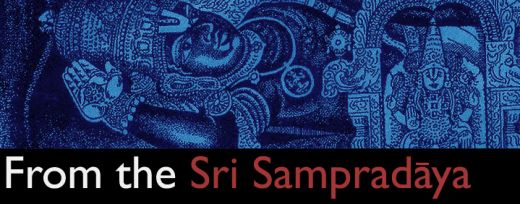Sri Pillai Lokacarya (1217-1323) was a great teacher in the Sri Sampradaya who authored several works important to his Vaishnava bhakti lineage including the eighteen rahasya granthas known together as Ashtadasa Rahasya and Gadyatraya Vyakhyanam. In his Srivachana Bhushan (308-310), Pillai Lokacharya, points out three reprehensible delusions which must be avoided by the guru at all costs. Sobering words for one who would accept the role or title of guru and useful also for one who seeks a genuine guru.
- The delusions of ‘preceptorship’ – thinking of oneself as the preceptor – a guru should think of himself as simply a conduit of the Lord’s Grace and not as a teacher of sacred lore, this awareness prevents the guru from developing the egotistical notion of being a great and learned person and having custodianship of spiritual knowledge.
- The delusions about the role of the disciple – thinking of the disciple as one’s own personal adherent – the disciple should rather be thought of as a co-disciple of the same acharya. Thus the guru avoids the potential for exploitation inherent in the relationship.
- The delusions arising from the process of instruction of a sisya (student or disciple) – these are of four categories-
a. seeking to gain financially from the disciple, either by tuition fees or dakshina.
b. the delusion that one is actually facilitating the liberation of the disciple.
c. the delusion that one is assisting the Lord in his salvific agenda.
d. seeking or expecting social companionship or service from disciples.
My source for this article was Kripamoya Das of The Vaishnava Voice, and I believe he may have sourced it from Sri Rama Ramanuja Achari’s article “Acharya-abhimanam — Resorting to a Preceptor”.
Kaustubha das

Comments
2 responses to “The Reprehensible Delusions of Guruship”
Certainly thinking of oneself as “a conduit of the Lord’s Grace” would also lead to feelings of egotism
To think, for example, I am a conduit, you are not.
The strength of the foremost teachers is their ability to reference the traditional texts and not simply speak from personal understanding or interpretation. In essence, to put the knowledge before themselves, to point to the knowledge base as the foundation and source, rather than identifying with personal feelings of grace, self-defined, self-identified.
If there is any problem with Sri Pillai Lokacarya’s description of the guru, it is more likely in the ambiguity of the English translation than his philosophical understanding. I can’t imagine any great Vaisnava teacher not recommending that the guru should refer to sacred lore. I thus think that when Pillai is quoted as saying, “The teacher does not think himself as a teacher of sacred lore,” it means that he doesn’t identity himself in an egotistic way as a learned devotee, not that he doesn’t teach sacred lore.
Similarly when it is written that the preceptor “thinks himself as a conduit of the Lord’s grace” it is not recommending self promotion, but a humbling self conception. “Via medium” is a description of a preceptor’s job meant to reconcile the truth that he is delivering something extremely important with the fact that he should not think of himself as important.
An analogy often used in this regard is the example of the humble postman. He or she may deliver a letter of immense value, but as the humble medium of deliverance, not the source of patronage.
So the purpose of Sri Lokacarya’s instructions to the preceptor is not to deny that he is delivering something rare and important, but to instruct him to do it as a humble servant of God. Srila Bhaktisiddhanta Sarasvati, a distinguished Vaisnava preceptor of the twentieth century, gave a similar sober warning, “One who thinks himself as guru is not guru, but garu (a cow or animal).”
Also it should be noted, that although the article instructs the guru to think of himself in humble terms, one seeking guru is searching for an advanced soul, a person who can not only parrot sacred lore, but who understands it so deeply that he can repackage it in interesting ways to suit the frame of reference of his audience without skewing the original message.